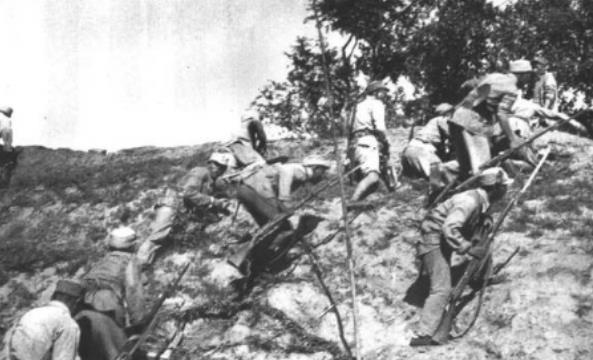During the Liberation War, the Northeast Field Army fought from the White Mountains and Black Water to the ends of the earth, fighting two of the three major battles, and annihilating a total of 1.88 million enemies, many of which were the troops of Lao Chiang Kai-shek's concubines. However, there are no victorious generals in the world, and Dongye has lost many battles in the Liberation War, such as the Battle of Siping and the Battle of Qingshuping. In fact, before these two battles, Higashino had also suffered a defeat, which was the Battle of Shaling. In this battle, Dongye concentrated the strength of 7 regiments not only failed to impress the enemy one regiment, but also suffered more than three times as many casualties as the enemy, and Wu Kehua, the commander of the four columns in charge of command after the war, was also transferred.

On February 11, 1946, the 66th Regiment of the 22nd Division of the New 6th Army (owed 1 battalion) and more than 2,000 people of the Division's Teaching Battalion were stationed in the Shaling area southeast of Panshan County. After receiving the news, Xiao Hua, commander and political commissar of the South Manchuria Military Region, decided to concentrate his forces to eliminate this prominent lone army. The New 6th Army is one of the five main forces of the Nationalist Army, all of which are equipped with American weapons and equipment, and made a name for itself on the battlefields of India and Burma during the War of Resistance Against Japan. The 22nd Division is the main force of the army, known as the "Tiger Division", known as "invincible at home".
In the face of a strong enemy, Xiao Hua did not dare to be careless, and all the three columns and four columns under the jurisdiction of the military district were sent to the battlefield, with the four columns taking the main attack and the three columns responsible for fighting for reinforcements. At dusk on 16 February, with wu Kehua's order, the four columns attacked the enemy with seven regiments. The enemy army resisted stubbornly under the command of regimental commander Luo Ying and deputy regimental commander Liu Zigao, and the battle was particularly difficult. In order to cover the infantry charge, the artillery regiments of the four columns fired more than 2,000 shells. However, due to the poor accuracy of the shooting, the effect was very unsatisfactory, and some shells even landed on our own positions.
Hu Run, the commander of the 28th Regiment, who was mainly attacking the southwest of Shaling Village, became angry and anxious, grabbed the phone and yelled at the artillery regiment: "Your shells have all hit my command post!" At that time, the artillery regiment of the fourth column had just been established, and its actual combat experience was very lacking, so it deviated greatly when shooting. The artillery of the Nationalist army are all veterans who have been baptized by the War of Resistance, and their skills are very skilled, and the shells are like eyes, constantly exploding in the charging team of our army, causing great damage.
The artillery regiment did not have the desired effect, and Wu Kehua had to order the troops to attack. But the enemy hid in the fortifications and did not come out, the heavy machine guns and flamethrowers spat out one tongue after another, and our attacking troops were crushed to the point of no return, and the casualties were very serious, of which the commanders and fighters of the 5th Battalion of the 28th Regiment and the commanders and fighters of the 2nd Battalion of the 29th Regiment all died heroically. After two days and three nights of bitter fighting, the four columns made little progress, and the enemy's reinforcements were about to arrive, so in order to avoid falling into greater passivity, Wu Kehua had to order the four columns to retreat.
In the Battle of Shaling, the four columns fired a total of 2,074 shells of various shells, and the infantry consumed more than 320,000 rounds of various bullets, annihilating only 624 enemy personnel. However, its own casualties were as high as 2159, more than three times that of the enemy. Among them, 1677 were wounded (including 1 regimental level, 9 battalion level, 56 company level, 95 platoon level), 332 killed (including 10 battalion level, 11 company level, and 13 platoon level), and more than 140 people were missing. In the Battle of Shaling, the four columns concentrated several times the enemy's strength, not only failed to destroy the enemy but also paid a great cost of casualties, and were seriously injured and moved to Anshan and Liaoyang to rest.
After the war, Wu Kehua, commander of the fourth column, was suspended from pneumonia and was soon transferred to the chief of staff of the Liaodong Military Region, with deputy commander Hu Qicai as commander and Han Xianchu as deputy commander of the fourth column. After the Battle of Shaling, the four columns put forward the slogan of "eating vegetables to eat cabbage hearts, fighting to fight the New Sixth Army", and in the subsequent battles, the more courageous the Vietnamese war, and the Tashan Blockade Battle was even more famous to the whole army. After the Battle of Jinzhou, Dongye launched the Siege of Western Liaoning, and Liao Yaoxiang, luo Ying, the former commander of the 66th Regiment who commanded the Battle of Shaling, and Liu Zigao, the deputy regimental commander, were all captured by our army.